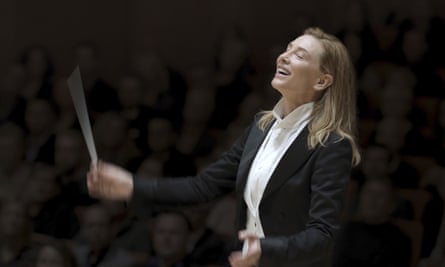Cate Blanchett’s new film role as an imposing orchestral conductor is earning her a shot at another top acting award. But it has already given the Oscar-winner the skills to lead a real orchestra through a score.
The actor, who plays fictional American conductor Lydia Tár in the film, Tár, mastered the complexities of the job by training with Natalie Murray Beale, an established star in the field who lives in London and who spent weeks coaching Blanchett for the part.
Murray Beale, the hidden force behind the powerful performance, supervised the orchestral scenes after guiding Blanchett during rehearsals.
“Cate can conduct now, if she wants,” Murray Beale told the Observer. “She is very musical, sings beautifully and now she has the tools to conduct. I suggested she learn the musical lines of the pieces by heart, rather than learning the score or copying another performance.” Murray Beale, 46, conducts opera, concerts and film scores and, like Blanchett, is Australian.
“We developed her own style, but she’s an actress who changes all the time and we didn’t want it to be fixed, since at that level of conducting there is no strict, standard way to do it. A top orchestra is virtuosic, so you don’t need to do all the basics; you can express yourself more. We looked a lot at the physical aspects, ensuring she would not be too reverent of the conductor’s podium, because after all it’s just her workplace.”
Some early audiences have protested about director Todd Field’s portrayal of a manipulative and selfish woman in a rare position of authority, but the musicianship and the examination of toxic power have convinced many who work in classical music.
“I’m delighted that colleagues say it is authentic,” said Murray Beale. “We went into great detail on the psychology of conducting. These abusive behaviours do still exist. There are not many places where a boss has such power. A conductor is a gatekeeper. I have witnessed anger in rehearsal and even a tussle between conductor and musician. It’s a highly competitive field.”
As a young conservatoire student in Australia, Murray Beale herself was affected. “I experienced inappropriate behaviour from a teacher, which I reported. And yet the person concerned was protected. It’s very difficult for institutions because they don’t want things to reflect badly on them.”
The conductor believes “the old boys’ club” has been broken down “to some extent”. “There is much more diversity now and the musicians have much more voice. That is a significant, positive change.”
Field’s decision to cast a woman in the role of an abusive “maestro”, she argues, allows audiences to see the problem “with fresh eyes”. Whatever cinemagoers decide about the treatment of the subject, Murray Beale adds, there is an overriding value to showing a woman as a highly skilled, admired musician.
“It’s very easy for people to have a strong personal reaction to this film, but for me the lack of visibility for female conductors is the real problem. So it was exciting to realise this film will be seen all over the world, particularly in places where women are never shown in such authoritative roles.”
One of the hardest elements of conducting is the task of absorbing all the musical material, but for Blanchett, Murray Beale suspects, the most difficult moment was her first encounter with the full orchestra in Dresden, Germany, where the film was largely shot. “Because of the lockdowns we hadn’t had much practice with that. Luckily, we were able to have some rehearsals. I said to Cate, ‘Just don’t be apologetic,’ and she developed a fantastic rapport. Whenever the musicians were drained and fatigued, she was able to flip the atmosphere by making them laugh.”
And Murray Beale soon detected a helpful, unexpected parallel between the plot of the film and the musical work of a conductor. “You need to create a lot of tension as a conductor, building up the sense in a concert piece that at some point it all has to break. I think this screenplay, and particularly the way the film has been edited, are just like that.”

